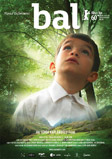20/09/2011
Christhoper McQuain / DVD Talk
Bal (Honey)
Like the light of some paradise lost beckoning us from the beginning of a tunnel, a portal drawing us back into the past as we trace a life in reverse-chronological order, Semih Kaplanoglu's Bal (Honey), the latest-produced but narrative-chronologically earliest film in the director's "Yusuf trilogy," glows from the gratification of putting the emotionally and culturally sundered parts of ever-conflicted Yusuf--the poet whom we have previously seen as an alienated, rootless adult in Yumurta and a frustrated, ennui-ridden late adolescent in Süt (Milk)--back together again. The film recounts the only time in this character's life--a tunnel with no guarantee of light at the end--when he was not divided into difficult-to-reconcile compartments and could simply be and live in the present. That present is, for the child Yusuf (played with a magnetic quietude by young Bora Altas), a magical, luminous, sometimes slightly ominous place, and Kaplanoglu renders it as a stunning vision, ending his trilogy on a magnificently high note with the best work of the three.
Yusuf's life consists of pleasant rituals--playing private games and gathering honey with his kind, wise father, Yakup (Erdal Besikcioglu), eating cozy meals with his family in their cabin--and not-so-pleasant ones, like going to school; Yusuf is a bright, open-minded, and imaginative child who loves to learn, but his struggle to read, particularly when it's aloud in front of the other, laughing and teasing children, causes him to lose out more often than not on the praise and little rewards the teacher, whom the little boy reveres, hands down to his students. The relationship between Yusuf and his father is privileged by Kaplanoglu, who slows down narrative time to near-stillness as Yusuf (along with us) takes in the majestic, serene forest where he and his father seek the honey that Yakup harvests and sells for the family's living. Under this benevolent, compassionate paternal tutelage, Yusuf observes the workings of the forest, the names and characteristics of the flowers and plants, and feels at one with his family and the natural world.
The loss of that oneness, that wholeness, and Yusuf's subsequent division within himself and lack of connection with the external world is the main dramatic/philosophical problem and through-line of the trilogy, and we find the first, irreparable crack in Yusuf's previously unified existence when a poor honey harvest and difficult economic circumstances force Yakup away from his family and home to seek richer supplies, and fails to return from the expedition with his comrades. Days go by; Yusuf senses that something is wrong and, despite his increasingly despondent mother's brave face, begins to be troubled (a state from which he will never fully return, at least not in any of the life stages we witness through the films). Has Yusuf's extremely vivid, meticulously imagined, strangely beautiful daydream of his father falling from a tree to his death in the course of work--which is the first thing we see in Bal, even before the film's opening credits--been a premonition? Did Yusuf's artistically visionary mind not only develop from the rift in his placid child's consciousness, but somehow actually cause that rift, as well, inviting the catalyzing tragedy that would transform him into a poet? In either case, Yusuf's becomes an artist because he is compelled by his prematurely broken-off childhood to attempt the impossible project of re-creating beauty from the broken pieces of a kind of inner mirror that once permanently reflected an existence so content, fulfilled, and whole that it did not need the consolation of art.
Kaplanoglu, retaining the trilogy's all-important art director, Nas Erayda, and bringing in cinematographer Baris Ozbicer for the first time, suffuses every frame with an almost hyperreal beauty; this is the world as it could only look in the memory of a childhood. There is an essential tinge of sadness around the edges of this world (essential because the sheer, overpowering beauty of every image could come to feel cloying or superficial without some kind of balance) that comes from the context of the trilogy's first two parts, in which we see Yusuf riven by the loss of the state of peace and practically suspended, endless time that Bal depicts. Ideally, this concluding film of Kaplanoglu's triad will be experienced as such, the end of a triple feature with Yumurta and Süt preceding it. Without prior knowledge of what will become of Yusuf, Bal's manifestation of the child he once was and the world as that child saw it--integrated, natural, fully present--could be too sweet, too pure, too perfect for your senses or your rationality to accommodate.
THE DVD:
Video:
Olive Films' transfer of Bal onto DVD is beyond reproach. This is a movie that has been visually constructed with an eye to pristineness of its images' colors, light, and shadow in order to reflect the (lost) pristineness of the film's world, and there is not a single moment on this excellent transfer that undermines that aesthetic aim.
Sound:
Like the rest of the films in the Yusuf trilogy, Bal has no non-diegetic music but plenty of minutely constructed natural and ambient soundscapes that create an indispensable layer of the film's texture, and the Dolby Digital 2.0 stereo soundtrack in which that sound design is presented here is true to the intentions of the artists who created it; full justice is done to all of the film's sonic content, down to crackle of a footfall in the forest or the rustling of leaves.
Extras:
None.
FINAL THOUGHTS:
Bal brings Semih Kaplanoglu's Yusuf trilogy to a climax in every sense: It is both the end (or, rather, the beginning) of the reverse-chronological story and its artistic high point. Viewing it is like stepping into a perfect world of innocence and true in-the-moment existence and openness--the state of grace that exists before the fall in a story that the human imagination has placed so often at the root of its religious and psychological myths, it may not be going too far to call it universal. Watching this film is like catching a full-on glimpse of the Garden of Eden, but from the outside, with all the joy, longing, and sadness that springs from the deep, vivid re-envisioning of a perfection lost forever.
Highly Recommended.
|
|
|




